‘We understand each other’: Seven young friends battle breast cancer together
These incredible women are all bonded by knowing how hard battling cancer is. Here they share their unique stories and how powerful friendship can be.
Lifestyle
Don't miss out on the headlines from Lifestyle. Followed categories will be added to My News.
It happens on the first Monday every month. A group of women walk through the doors of an old character home in Frewville in Adelaide’s east.
At first glance they look like any other group of women coming together for a catch-up. But this friendship circle is a little different and incredibly special.
There’s Kate Hitchin and Naomi Hubbard. There’s also Anne Horstmann, Lauren Lores, and Miriam Crellin. Waiting for them inside is Lee Hutton.
Each of the women is united by their shared experience of battling breast cancer, bonded by a deep understanding of the fragility of life and death.

They are all battlers. In fact, most have been given the all-clear and are free of the shackles of endless treatments and rounds of chemotherapy.
But they each anticipate that once-a-month Monday meeting as part of Cancer Care Centre’s Young Women’s Support Group. A time where they can truly share their feelings, talk about the residue of trauma, their ongoing fear of cancer returning and the isolation they face as family and friends think “it’s all over”.
“We can have meltdowns in this room and no one feels uncomfortable,” Hutton says.
“We all relate and we understand and we are perfectly comfortable with everybody’s difficult feelings and expression of emotion.”
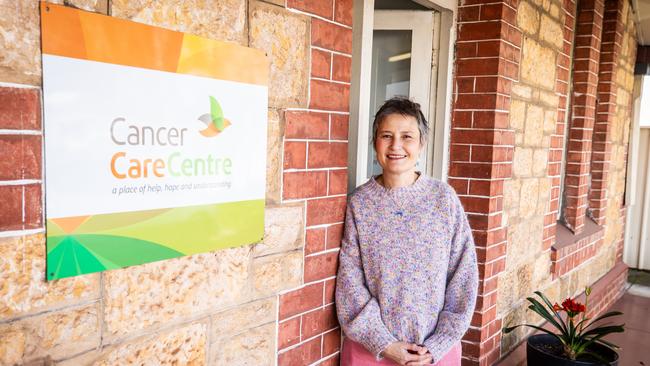
Hutton, who has been a facilitator at the Cancer Care Centre in Frewville since 2017, admits there’s an unrivalled camaraderie that comes from sharing with those who truly understand, who have walked in your shoes.
Speaking to SA Weekend, each of these incredible women opens up about the power of friendship as they reflect on their cancer journey and show a united braveness in the face of adversity.
Anne Horstmann
There’s two worlds for Anne Horstmann.
The 47-year-old from the Hills says there’s those in the “cancer world” and those in the “outside world”. She explains that those in the cancer world trade in stories of survival and sorrow. But those in the outside world struggle to hear about the journey.
“They might ask you how you’re going, they feign this general interest but they stop wanting to know anything,” Horstmann says. “That’s what’s so important about the group, when you do know that you need to talk about something, you don’t have to worry about judgment or you don’t need to consider someone else’s feelings.”
For Horstmann, her cancer journey started back in 2018. The “boob bus” from BreastScreen SA parked in front of the medical centre where she worked and a colleague told her to have a mammogram because she was 40.
She had no symptoms and had felt no lumps – but a shadow appeared.
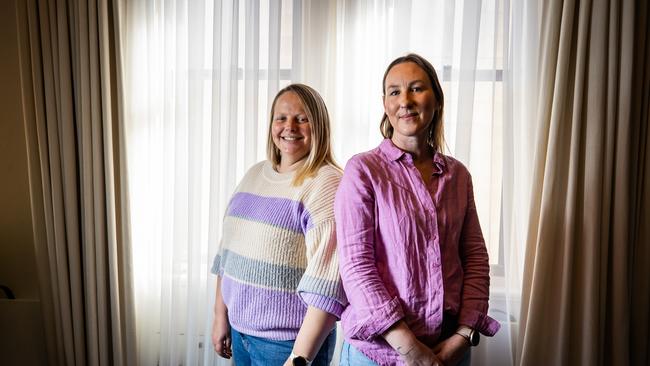
“Everyone said …‘You’re young, it’s not going to be cancer, it’s not going to be you,’” she says.
“I’m like, ‘Well why isn’t it going to be me, one in seven women will be diagnosed, why isn’t it going to be me?’ I was always very pragmatic about it.”
When the doctor told her she had breast cancer, she recalls reacting calmly.
“It wasn’t until I got to work, where my best friend was. She was on the desk and I walked in and I just lost it and I knew then that my life had changed for good.”
Horstman beat cancer but has yearly MRIs to check for changes. It’s the anxiety around the scans that the friends talk about a lot in their monthly meeting – a sense of “scan-xiety”. “It is there, in the back of your mind,” Horstmann says. “Some days it is more to the back … some days you wake up and it’s just right there.”
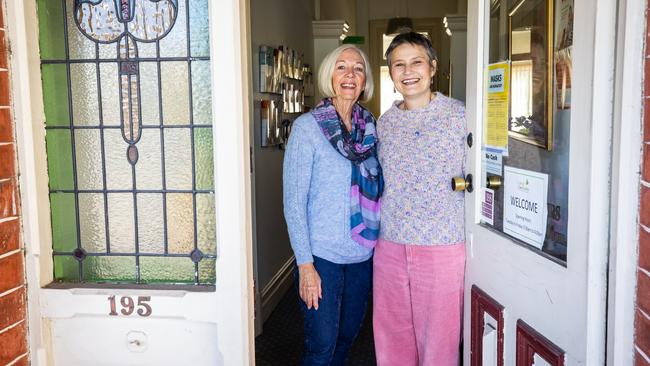
Jessica Marechal
It’s been five years since Jessica Marechal was diagnosed with breast cancer after finding a lump when she was breastfeeding her son.
The diagnosis was the start of a traumatic journey. The 38-year-old not only had to wean her baby son off breastfeeding but started chemotherapy.
She would eventually go through 16 rounds in total, including a lumpectomy and 30 sessions of radiation before she was given the all-clear.
Marechal was forced to stop work as a social worker to undergo treatment and her husband had to change jobs to care for her and their son and daughter.
“He was basically my full-time carer because I was so unwell,” Marechal says. “By April 2020 I finished all my radiation and then I was trying to get back into my life.”
But five weeks ago, when her lymph nodes in her neck started to swell, she booked in straight away with the doctor.
While tests showed there was no cancer, doctors wanted to remove them to be safe. Marechal’s loved ones were relieved.
She wasn’t.
But in the confines of their meeting room, Marechal admits she felt “heard” as her cancer buddies understood her feelings of fear.
“You get a random lump or a random pain and then your head just goes straight to, ‘I can’t do this again’,” she says.
Kate Hitchin
Kate Hitchin is often shocked by how far she has come. Before cancer, she confesses that she was definitely more closed off and not one to share emotions and feelings.
But fast forward to today and the 43-year-old credits this friendship circle in helping her navigate conversations about trauma or just tricky periods in life.
“I’ve noticed now I’m better able to support other people who are going through things, not necessarily cancer, but someone shared something with me recently. It was really horrible and difficult and I’m like, ‘That really f--king sucks and I’m gutted for you’,” she says.
“I didn’t put any ‘but you’ll be okay’ or any positivity. It sucks, I want to validate how f--king shitty that is and be in there with you without the ‘you’re so strong, you’ll get through this’.”
And Hitchin is the first to know about shitty periods in life. At 41 years old, back in March 2022, she was diagnosed with cancer.
Her journey was hardly textbook.
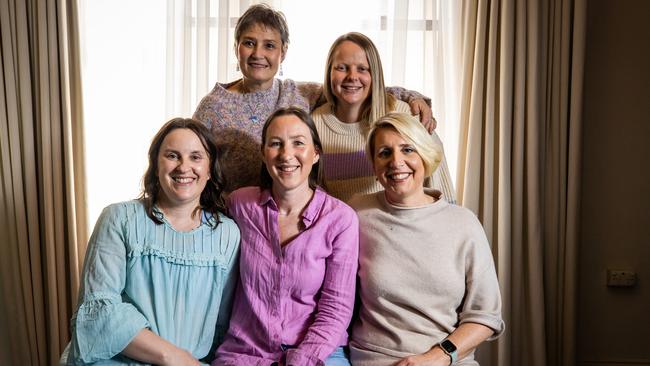
She was initially told she had pre-cancer but decided to have a mastectomy.
“I went for the surgery and then they called with the pathology results a few days later and said, ‘Oh we’ve actually found some invasive breast cancer’,” she says.
She went on to have 56 weeks of treatment.
“I had my surgery first and then I had four rounds of what they call The Red Devil and they call it that for a reason,” Hitchin says.
There were 12 rounds of paclitaxel and an immunotherapy, five or six months of chemo and even a round of radiotherapy.
It’s an experience that only a few can truly understand – the few who meet on that Monday every month, she says.
Naomi Hubbard
Naomi Hubbard’s dad saved her the Body and Soul magazine liftout from The Sunday Mail and an article in an October issue in 2016 about checking your breasts saved her life.
“He actually took that bit out and said, ‘You should do that’, obviously he didn’t use the word breasts because he’s a dad,” the
44-year-old laughs.
Eventually Hubbard did a self examination, found a lump and booked to see her GP.
She will always remember the day she got her results with a storm clouding the skies over Adelaide.
Her doctor muttered the words no one ever wants to hear, “You’ve got breast cancer.”
“I didn’t hear anything else.
“Everything was like you’re underwater,” she says. “I came out of the doctor’s surgery and the sky was grey and then all of a sudden it just opened up and bucketed down and I thought that was quite amazing.

“To this day when it rains I get a bit stressed, especially when it’s from nothing to something.”
Hubbard went on to be diagnosed with HR positive breast cancer and underwent chemotherapy, mastectomy and radiotherapy.
“I remember thinking I might never be able to eat again because the nausea was so bad,” she says.
Doctors told Hubbard radiation has no side effects but she says going through it was “devastating”. “There are so many things that come firing at you, like you can’t have anymore children, you can’t have a reconstruction because (they) burnt the skin so badly,” she says.
Hubbard is still undergoing treatment every three weeks and will be indefinitely.
“How much does one person have to deal with?” she asks.
Lauren Lores
Mum-of-two Lauren Lores was in her caravan, packing for a six-week road trip around Western Australia with her family when she received a call from her doctor.
What she thought was a blocked milk duct, as she was breastfeeding, was in fact breast cancer.
“I felt shocked in the first moment,” she says. “But then I got practical.
“The doctor kindly let me know this kind of thing needs to be dealt with now.
“I felt like my whole world was shifting and falling apart. I felt panicky. All of a sudden I had I had thoughts like ‘does this mean I am dying?’, ‘how many years do I have to live?’, ‘will I see my girls grow up?’
“As soon as I got off the phone I started Googling survival rates.
“My heart started to race and I felt like I just wanted to wake up from this nightmare and escape these awful feelings.
“I had to call my husband and tell him the news over the phone as he was at his parents’ house with our two girls, dropping the dog off. Then I called my parents and my siblings.”
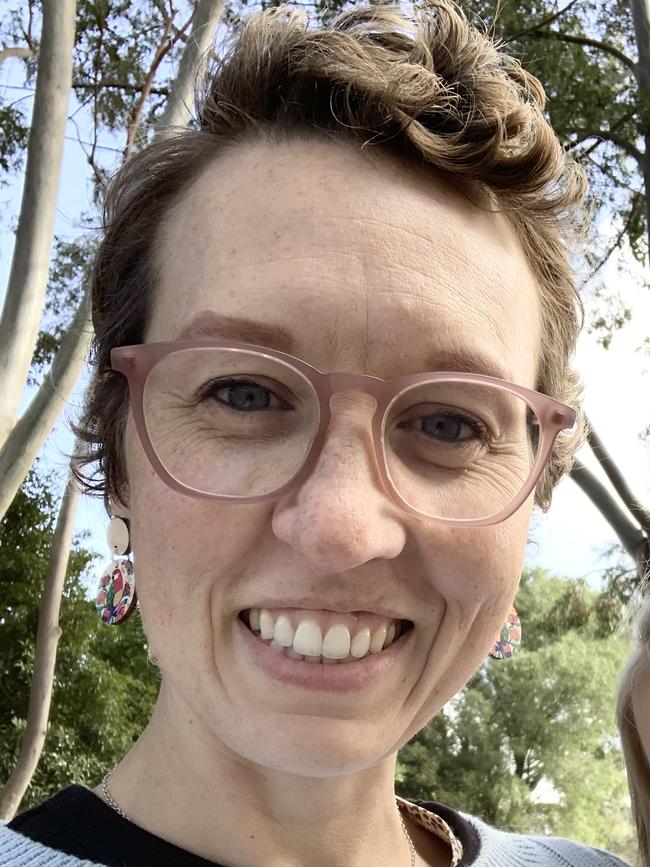
Inevitably Lauren’s trip was cancelled and she was whisked into months of treatment, diagnosed with stage three breast cancer.
“I’ve felt very alone,” she says. “In situations like being the only young person in a waiting room or the only one of my friends wearing a headscarf covering my bald head.
“In some moments it’s made me feel unique and in other moments it’s made me feel like I took a wrong turn somewhere.”
Since her treatment Lores is now cancer-free and she has just left on a caravan trip which her family has extended to six months.
“It was such an emotional moment when we finally pulled out of the driveway a year later, with surgery, chemo and radiotherapy behind me,” she says.
“I’m still on hormone therapy and will be for five or more years but I can manage that on the road.”
Miriam Crellin
Miriam Crellin wasn’t actively checking when she found a lump in her right breast.
“I was just lucky to have noticed a little pain in the area when pressure was applied there,” she says.
She was living in New York when she made the discovery and finding out whether the lump was malignant in the American healthcare system was fraught with red tape.

Eventually she found out her worst fears were true – she had breast cancer.
“It felt completely surreal,” she says.
“The shock wore off a bit and became fear, and then the fear just kind of gave way to decision-making and logistics.”
She had to make a choice.
Would she stay in America or move back to Adelaide and battle cancer at home? The choice to Miriam was simple. She returned home and went through treatment, soon finding friendship with the support group.
“When you have cancer, you become hyper-aware of just how ubiquitous cancer is in most of our lives,” she says. “There are so many triggers that bring up painful things, especially when we encounter friends, family members or even acquaintances with cancer diagnosis.
“These experiences can hit differently for those of us who have, or have had, cancer and still have to test every year to make sure it hasn’t returned.” Following her treatment, Miriam, 40, moved back to New York and she now continues to join the support group via Zoom.
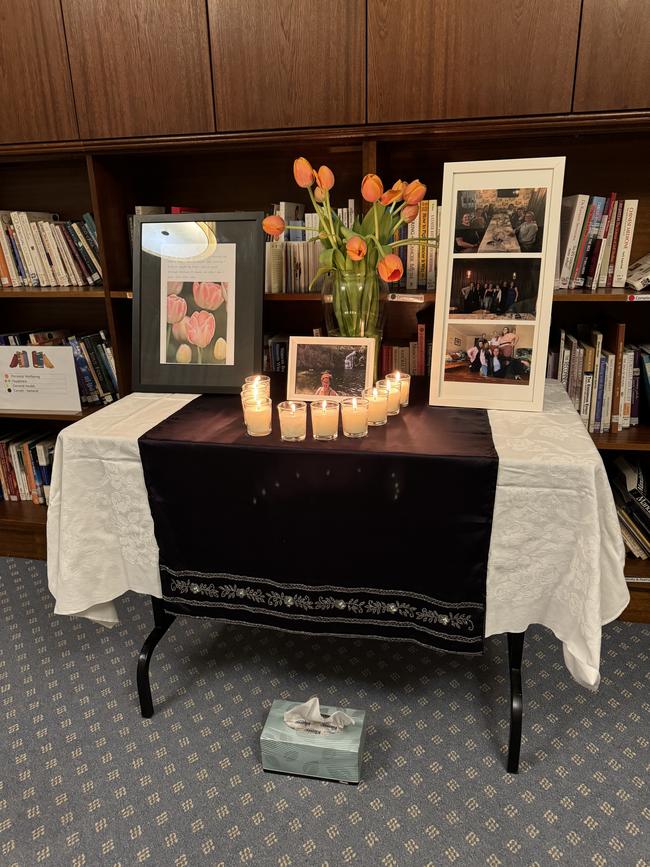

Lee Hutton
The group’s facilitator Lee Hutton says the group has been through a lot together, including the passing of their friend Kristy Kamin, who died earlier this year.
“She always had a genuine interest and energy, care and concern for everyone in the group and what their issues were,” Hutton says. Together the group honoured her in a memorial where they framed some of Kristy’s final words:
“In the end, we only regret the chances we didn’t take. I do not regret the chances I took or anything that I did or went through because it made me who I am and I love who I am.”
When the women get up to leave from their Monday meeting, they all go back to their real lives. Marechal is picking up her kids. Hitchin has work to continue with. Horstmann has to organise a way for her daughter to get home from school.
At the end of every session they step out the door and continue living their lives on the outside world, each knowing they have a group of friends who truly understand the complexities that come with cancer.
More Coverage
Originally published as ‘We understand each other’: Seven young friends battle breast cancer together





